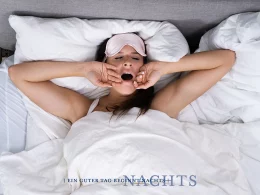Waking up once or even several times during the night because you have to go to the toilet is extremely unpleasant. Nocturia, as the urge to urinate at night is also known, is an annoying interruption to sleep and can lead to a lack of sleep, exhaustion and a reduced quality of life if it occurs regularly. But why do you often have to go to the toilet at night, what can cause it and what can you do about it?
Why do you often have to go to the toilet at night?
Like so many processes in our body, nocturnal urine production is hormonally controlled by the antidiuretic hormone (ADH). Due to an increased release of ADH during sleep, the body normally produces less urine. This makes it more concentrated. This means you can sleep through the night without having to go to the toilet.
However, there are various reasons why you need to urinate more frequently at night. The most common cause is age. The older you get, the more your body’s ability to store urine over a longer period of time decreases. In addition, the hormone balance, especially ADH, can change with age.
How much fluid you drink before going to bed also plays an important role. If you consume large amounts of liquid in the evening and shortly before going to bed, you run the risk of one or even several trips to the toilet disturbing your night’s sleep. The consumption of caffeinated and alcoholic drinks in particular has a negative effect here, as these have a diuretic effect and increase urine production.
However, even those who hardly drink anything during the day and drink large amounts of fluids in the evening must expect to have to go to the toilet frequently at night and therefore run the risk of not getting enough sleep.
You can find out what effects and consequences a lack of sleep can have in our blog post Sleep deprivation – how it makes you ill and how to beat it.
What can cause the urge to urinate at night?
In addition to the factors already mentioned, there are numerous medical causes that lead to nocturia. For example, those affected may suffer from a urinary tract disease such as cystitis or another infection that constantly irritates the bladder. In men, an enlarged prostate can put pressure on the urethra and affect the emptying of the bladder, leading to a frequent urge to urinate. Diabetes can also be a reason why you often have to go to the toilet at night. Especially if the disease is poorly controlled with medication or has not yet been recognised, the body tries to excrete excess blood sugar via the urine. In addition, heart disease, sleep apnoea, kidney disease and hormonal changes – in women during the menopause, for example – can lead to an increased urge to urinate at night.
What can be done about nocturia?
There are various ways to reduce or completely prevent the urge to urinate at night. In many cases, simple changes in lifestyle and diet can help. Fluid intake should be regulated and optimised. It is important to drink enough during the day. From the early evening onwards, however, fluid intake should be reduced. Caffeinated and alcoholic drinks in particular should be avoided, as they stimulate urine production – as already mentioned.
Bladder training can also help to strengthen the bladder and better control the urge to urinate. This can gradually increase the intervals between visits to the toilet.
In the case of medical causes such as diabetes or an enlarged prostate, medication can help to reduce nocturia. In the case of sleep apnoea, targeted treatment of breathing disorders can be helpful. Other illnesses can also be treated with medication to prevent the need to go to the toilet at night.
What else can help with nocturia?
There are numerous natural approaches and proven home remedies that can help to reduce the urge to urinate at night and strengthen, soothe and regulate the bladder. From hot water bottles to camomile tea, nettle tea and pumpkin seeds, from pomegranate juice to cranberry juice and acupressure, there are numerous home remedies that are designed to provide relief for those affected.
In general, however, it can be said that if you have to go to the toilet regularly at night over a longer period of time or if you experience other symptoms, it is advisable to consult a doctor to identify and treat possible underlying conditions. This can not only reduce nocturia, but also contribute to more restful sleep and a better quality of life.
You can find more tips and home remedies for falling asleep in our blog post Sleep aid and home remedies to help you sleep through the night.
Suitable bedding does not have a direct influence on whether and how often you need to go to the toilet at night. However, they can promote a good night’s sleep and ensure that you fall asleep again quickly. We would particularly like to recommend the SARI® silk duvet, which provides a pleasant sleeping climate even on the hottest nights in summer. The light summer filling consists entirely of soft, cooling and skin-friendly tussah silk, which ensures pure sleeping pleasure. We also recommend the ADELE® natural pillow made from cosy new wool, which provides medium support, regulates moisture and temperature and – thanks to the new wool filling – has impressive self-cleaning properties. The MULTILIND® topper is also filled with virgin sheep’s wool and therefore not only impresses with its pleasant and soft lying comfort, but also with its high breathability, excellent temperature and moisture management and remains hygienically fresh for a long time. With these products, nothing stands in the way of restful and peaceful nights.














